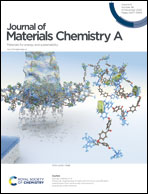Single-atom Ru anchored in nitrogen-doped MXene (Ti3C2Tx) as an efficient catalyst for the hydrogen evolution reaction at all pH values†
Abstract
Precise control of isolated single-atom ruthenium (RuSA) sites supported on nitrogen (N)-doped Ti3C2Tx MXene (N-Ti3C2Tx) through a coordination-assisted strategy is reported. The catalyst displays superior activity toward the hydrogen evolution reaction (HER). The atomic dispersion of RuSA on N-Ti3C2Tx is verified by spherical aberration-corrected electron microscopy and X-ray absorption fine structure measurements. The resultant RuSA–N-Ti3C2Tx catalyst exhibits outstanding catalytic performance with low overpotentials of 23, 27, and 81 mV to achieve a current density of 10 mA cm−2 in 0.5 M H2SO4, 1 M KOH, and 1 M PBS solutions, respectively. In addition, RuSA–N-Ti3C2Tx shows long-term stability with negligible degradation in basic, acidic, and neutral media, which is much better than that of the commercial Pt/C catalyst. Density functional theory calculations suggest that the strong covalent interactions between RuSA and N sites on the Ti3C2Tx MXene support contribute to the exceptional catalytic performance and stability. This work provides a coordination-engineered strategy to effectively modulate the catalytic properties of the MXene family by an atomic-level engineering strategy.



 Please wait while we load your content...
Please wait while we load your content...